- Home
- Joy Fielding
Heartstopper Page 12
Heartstopper Read online
Page 12
“I don’t eat fried food.”
“Just what do you eat?” John demanded angrily.
“John,” Pauline warned.
“I eat lots of things.”
“Like what? What?” he demanded, knowing this was the wrong tactic to take, but unable to stop himself. Rita Hensen, the school nurse he’d consulted when Amber’s weight had dipped precariously low, had told him that eating disorders were almost impossible to treat until the girl was ready to do something about it herself, and even then, it was probably something she’d struggle with all her life. It was pointless to yell at her. Society had already done too good a job at bullying girls into believing that the ideal woman looked like a prepubescent boy.
And then there were the women on the opposite end of the spectrum, John thought. Women like Kerri Franklin, who looked more like plastic dolls than human beings.
Although he had to admit—he liked to look.
What the hell was wrong with everybody?
When had looking like a real woman ceased to be a viable option?
“I don’t want to have this discussion,” Amber said, lying down and pulling the covers over her head to signal an end to the conversation.
“Amber….”
“John,” his wife urged. “Leave it alone.” She pushed him gently from the room.
John understood that the only thing Amber felt she could control was her weight. The world was a big and terrifying place, especially for girls on the verge of womanhood.
In light of what had happened to Liana Martin, he thought, who was he to disagree?
TEN
I heard you were the one who found Liana’s body,” Delilah said as Cal Hamilton ushered her inside the darkened bungalow. Outside it was a sunny and warm afternoon—the warmest Saturday this month, the radio announcer had proclaimed on the drive over—but inside the icy, air-conditioned house it might as well have been the middle of the night. Or so it seemed to Delilah, whose eyes took several seconds to adjust to the dramatic change in light. She tugged on the hem of her loose white shirt, self-conscious about the stubborn roll of flesh that spilled over the low-rise waistband of her jeans. She hated the jeans’ uncompromising cut, the unflattering way they dissected her midriff, adding bumps to already unsightly bulges, emphasizing that which was already exaggerated enough. Why couldn’t someone design clothes that actually fit real people—according to recent studies, more than half the population of the United States was significantly overweight—and not just the Amber Webers and Megan Crosbies of this world? When had the majority of purchasers become an undesirable demographic? Where was the sense in that?
Not that anything made much sense these days.
“Pretty grisly sight,” Cal said as he led Delilah toward the kitchen at the back of the ultratidy, little house.
Delilah snuck a peek into the tomblike living room, where the furniture, like wary sentinels, stood guard. She wondered if anyone actually ever sat in the uncomfortable-looking, straight-backed sofa or high-backed wing chairs and hadn’t been surprised, on previous visits, to find the lampshades still covered in plastic. At first she worried that it was dangerous to have plastic wrap so close to a lightbulb, but she quickly concluded that those bulbs were probably never turned on, so what difference did it make? Her mother claimed the plastic would eventually warp the shades, but Delilah doubted Cal Hamilton would notice. It was too dark.
In the kitchen, as in every room she’d seen, the blinds were pulled tight, although the sun had managed to slip between several uneven slats and was spraying rays of light, like lasers, across the mustard-colored ceramic tiles of the floor.
“What happened? Did you, like, step on her?” Delilah crossed over one beam of light, then came to an abrupt halt between two more when Cal stopped suddenly and spun around.
Cal Hamilton shook his mop of wavy blond hair, a derisive sound escaping the natural snarl of his lips. Clearly he found the question idiotic. “A couple of the boys saw a mound of earth they thought looked suspicious. We decided to check it out.”
“And you found Liana?”
“No. We found the Pillsbury doughboy.” Cal’s voice dripped sarcasm and impatience in equal measures.
Immediately Delilah’s eyes filled with tears. She lowered her canvas tote bag to the round kitchen table and stared at the floor, suddenly grateful for the oppressive darkness. As much as she’d grown used to—even inured to—the hateful taunts of her classmates, she’d never been good with sarcasm. It sliced through the folds of flesh between her ribs with the effortlessness and efficiency of a sharp blade aimed directly at her heart, especially when wielded by an adult. Even though Delilah didn’t much care for Cal Hamilton—she found him crude and egotistical—still, she wanted him to like her. Something else that didn’t make a whole lot of sense.
“Of course it was Liana,” Cal said, his voice softening. “Although she wasn’t exactly looking her best.” He paused, cocked his head to one side. A wave of blond hair fell seductively across his forehead. “You gonna ask me how she looked?”
Delilah shook her head. “No.”
“Good. ‘Cause she looked god-awful.”
Delilah swallowed, feeling her throat go all dry and prickly, causing her next words to scrape against her throat. “Somebody said her head was missing.”
“Somebody’s exaggerating. As usual.” Cal smiled. “Only half her head was missing.” He slapped his hands against his thighs. Ba da bum. “Anyway, much as I’d love to stay and continue this discussion, I gotta run.”
“Oh, sure. I didn’t mean to keep you.”
“There’s beer in the refrigerator, and liquor in the dining-room cabinet.” He winked to let her know he was kidding. “And don’t answer the phone if it rings. Let voice mail take it.” He crossed to the back door at the end of the counter. The door opened into the carport at the left side of the house.
“Is Mrs. Hamilton home?” Delilah asked. Silly question, she thought immediately. Why else was she here?
“She’s sleeping.”
Delilah stole a look at her watch. It was barely two o’clock in the afternoon, and while she knew that grownups often took naps in the daytime—Grandma Rose nodded off for precisely twenty minutes at four o’clock every day, and God forbid you did something to disturb her—Fiona Hamilton wasn’t that much older than she was—was she even thirty?—and so it seemed odd that she was always sleeping. She’d been sleeping on the two previous occasions she’d been here, Delilah remembered, wondering if the woman was suffering from some kind of medical condition, and hoping it wasn’t contagious. I have enough problems, she thought, feeling selfish and guilty in equal measures.
“She had kind of a rough night last night,” Cal said, and winked again.
Delilah tried not to catch the meaning of that wink, although she felt an unexpected, and highly unwelcome, fluttering between her legs. What was the matter with her? Was she actually titillated by the vague boasting of this steroid-bound cretin?
“Anyway,” he continued, “routine’s the same as last time. Make yourself comfortable. Don’t play the TV too loud—”
“I brought a book,” Delilah interjected, holding up her copy of Cry, the Beloved Country. Mrs. Crosbie had instructed the class to have the first half of the novel finished by the end of next week, but she intended to read the whole thing. That is, if she could turn on a light.
“—use your cell if you want to talk on the phone,” Cal continued as if she hadn’t spoken, “and if my wife wakes up before I get back, make sure she doesn’t leave the house.”
“Is your wife all right, Mr. Hamilton?” Delilah asked before she could stop herself. She was aware of the rumors regarding Fiona Hamilton being a battered wife.
Cal Hamilton looked uneasily from side to side, as if debating with himself whether to answer her question or send her flying across the room. “No,” he said finally. Then after an even longer pause: “It’s not that she’s sick exactly, but …”
&
nbsp; Delilah held her breath. But …? she asked silently.
“She’s just not quite right,” he continued, as if he’d decided he could trust her. “In the head, I mean. Not that you have to worry about anything,” he added quickly. “She’s not violent or anything like that.”
“Violent?” The word popped from Delilah’s mouth and ricocheted off the kitchen walls, like a steel ball in a pinball machine.
“I said she’s not violent,” Cal stressed, then laughed. “Hell, she’s as timid as a church mouse, for Christ’s sake. She just has all these phobias she’s trying to deal with.”
“Phobias?”
“Irrational fears,” Cal qualified. “At least that’s what her shrink says.”
“She sees a psychiatrist? Where?” Delilah knew there were no psychiatrists in Torrance, although she thought the town could probably use one.
“Well, not here, that’s for sure,” he said, as if reading her thoughts. “Back in Miami.”
“What kind of phobias?”
“You name it, she’s got it.” Cal shook his head. More blond hair fell across his forehead. “Let’s see. She’s afraid of heights, afraid of snakes, afraid of crowds. She’s claustrophobic, agorphobic—”
“Agoraphobic,” Delilah corrected, then bit down hard on her tongue. Probably not a good idea to correct him, she was thinking as a cruel smile stretched slowly across his lips and his hands formed loose fists at his sides.
“Yeah, that’s it. Agoraphobic,” he said. “She’s afraid to go outside the house.”
“Technically it means a fear of the marketplace. I read about it in Cosmo.”
“Is that so?” He pushed the hair away from his face. “She tries, you know. That’s part of the problem. Poor girl gets it into her head that she’s gonna go out, and she takes off without me, and pretty soon she panics and starts running around like a chicken with its head cut off. People find her, they have to call me, she gets all humiliated. We have to start all over again from square one. That’s why she’s a little self-conscious and uncomfortable with people, why she doesn’t say a whole lot, and why sometimes what she does say doesn’t make a whole lot of sense. Anyway,” he said loudly in the same breath, the word punctuating the air like an exclamation point, “I really gotta go.” He checked his watch. Delilah noticed it was a Rolex and wondered how he could afford such an expensive item. She concluded the watch must be fake, then wondered how much of anything he’d told her was genuine. “I’m runnin’ a little late.” Cal opened the rear door that led directly into the carport. “Be back in a couple of hours. Take care of my girl.”
“Don’t worry about anything,” Delilah said, watching him about to climb into his shiny red Corvette, only to pause for several seconds and stare into the backyard of the house next door. “Forget something?” she asked, but he ignored her. In the next instant, he was behind the wheel and backing onto the street. She’d always wanted to own a car like that, Delilah thought, catching sight of Megan Crosbie sunning herself in a skimpy white bikini in the next yard, and remembering the Crosbies lived next door. So that’s what Cal Hamilton had been looking at, she realized with a shake of her head. She closed the kitchen door, wondering if a man would ever look at her that way.
Got to lose a few pounds first, sweetie, she heard her mother say in that hopeless nasal twang she’d been unable to shake, despite repeated voice lessons. It seemed vocal cords, unlike other, more pliant parts of the body, were remarkably resistant to alteration. Her mother could plump up her lips all she wanted, but the sounds that escaped them would stubbornly remain the same.
Delilah shrugged as she opened the refrigerator door, then shrugged again as she perused the contents. Milk, orange juice, beer, more beer, a few green apples, some limp celery, a leaf of pale green lettuce that was turning brown at the edges, more beer. She checked the freezer, found three large boxes of DoveBars, all open. “Better not,” Delilah whispered, closing the freezer door before she gave in to temptation, and deciding on water instead. Her grandmother had told her that if she drank a glass of water every time she felt like eating, she’d be less hungry, and therefore less inclined to overeat. With fresh determination, Delilah crossed to the sink and poured herself a glass of water, inadvertently glancing between the slats of the blinds covering the small back window and staring into the Crosbies’ backyard just as Megan Crosbie sat up in her deck chair and began applying sunscreen to her slender thighs. She’s so pretty, Delilah thought. Bet she never had to choose between water and a DoveBar. But she didn’t begrudge Megan her long legs and tiny waist. Megan had always been, if not exactly nice to her, then at least never overtly mean, even though she had more reason to be nasty than the other kids, considering it was Delilah’s mother who was responsible for Megan’s father leaving home.
Megan finished smoothing on her sunscreen, then glanced toward the Hamilton house, as if she knew she was being watched. Instinctively, Delilah raised her hand and waved, but her wave went unanswered as Megan adjusted the angle of her lounge chair and lay back down, surrendering to the sun’s warm rays. Delilah sipped at the water in her glass, knowing the slight had been unintended, that Megan couldn’t possibly have noticed her standing there behind the closed blinds. Why were the blinds shut anyway? she wondered. Why was the house always so dark? Was Fiona Hamilton afraid of the sun as well as being agorphobic? She laughed and turned away from the window.
The woman, more apparition than human being, was standing in the entranceway to the kitchen, her thin arms hanging limply at her sides, her bare toes peeking out from underneath the bottom of her white nightgown. Long, sandy hair fell loosely past her shoulders, swamping an already fragile face, and accentuating the intensity of her large, blue-green eyes.
Delilah gasped at Fiona Hamilton’s unexpected appearance. The glass of water she was holding slipped from between her fingers and crashed to the tile floor, shattering instantly.
“Oh, no,” the woman cried, although she didn’t move.
“It’s okay. I’ll clean it up.” Delilah was immediately on her hands and knees in the pool of spilled water, stretching in all directions to retrieve the sharp pieces of broken glass. “I’m so sorry. I didn’t hear you come in.”
“What have I done? What have I done?”
“You haven’t done anything,” Delilah said quickly. “I was just a little startled, that’s all.”
“You’re bleeding.”
Delilah looked at her hand. Blood was indeed dripping from a small cut on her index finger. Was Fiona afraid of blood too? “It’s nothing.” She wiped her finger on her jeans, held it up again. “See? It’s fine.” The finger immediately resumed bleeding.
“Oh, God. Oh, God.”
“Mrs. Hamilton, it’s really just a little cut.” Delilah pushed herself to her feet, quickly discarding the pieces of glass she’d collected into the bin underneath the sink, then turning on the cold-water tap and holding her finger beneath the water’s icy flow. It stung, but she held it there, afraid that should she remove it, it might start bleeding again, and then Fiona Hamilton might collapse altogether. “Should you be out of bed?”
The woman glanced over her shoulder, then back at Delilah. She said nothing.
“Mrs. Hamilton, are you all right?”
“You broke the glass.”
“I did. I’m sorry.”
“Oh, God. Oh, God.”
“It’s all right. I’ll replace it.”
“Those are Cal’s favorites.”
“What?”
“The glasses. He’ll be so upset.”
“They’re just ordinary glasses, Mrs. Hamilton. They’re not expensive. We have the same ones at home. You can buy them at Publix.”
“Oh, God. Oh, God.”
“I tell you what: I’ll call my mom, get her to pick up a new one right away,” Delilah offered, pulling her fingers away from the tap water and retrieving her bag from the kitchen table, then ferreting around inside it for her cell phone. She quickly pr
essed in the numbers and lifted the small phone to her ear.
“Oh, God. Your purse.” Fiona pointed to the small red fingerprint in the middle of Delilah’s canvas bag.
“It’s okay. It’s okay. It’s an old bag. No big deal…. Hello, Grandma Rose?” For the first time that Delilah could remember, she was actually glad to hear her grandmother’s voice. “Is my mom there? Could you get her, please?”
“Kerri!” her grandmother shrieked directly into the receiver.
Delilah pushed the phone away from her ear, regarding the young woman trembling in the doorway. Her whole body was shaking, Delilah realized. Was she more afraid of the blood, the broken glass, or how her husband might react? It was just a cheap glass, for God’s sake. Did Fiona overreact this way to everything?
“She’s not answering,” Delilah’s grandmother announced after several seconds. “I don’t know where she is.”
“Could you try again?”
“Why? Is there a problem?”
“I’m at the Hamiltons’. I broke a glass.”
Fiona started whimpering.
“You what?”
“It was an accident.”
“Honestly, Delilah. You’re like a bull in a china shop.”
Thank you for that, Delilah thought, trying to decide which woman she’d rather deal with—the witch on the telephone or the nutcase in the doorway. “Look, they’re the same glasses we have in the kitchen. I need Mom to go to Publix as soon as possible and bring me a replacement.”
“Why can’t you go?”
For a minute Delilah wondered the same thing. Surely she could just run to the store for a few minutes. Fiona Hamilton was an adult, not a little girl. Except that this adult was standing there trembling, clearly unhinged by the sight of a broken glass and a cut finger, so how could she leave her alone? “I can’t, Grandma Rose. Please, could you just ask my mother to do this for me?”
Silence.
It took Delilah several seconds to realize her grandmother had hung up. “Thank you. I appreciate that,” she said to the silence that followed. She returned the cell phone to her bag, forced a smile onto her lips. “My mom’ll be here soon.”

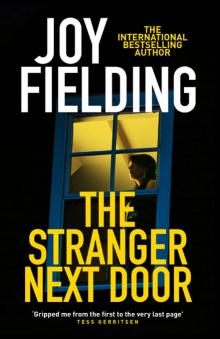 The Stranger Next Door
The Stranger Next Door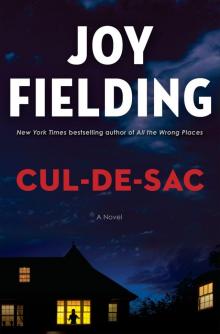 Cul-de-sac
Cul-de-sac The Final Act
The Final Act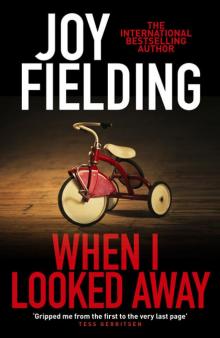 When I Looked Away
When I Looked Away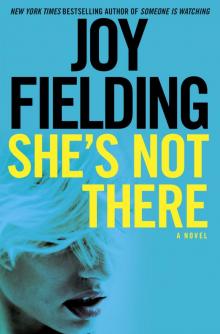 She's Not There
She's Not There All the Wrong Places
All the Wrong Places Now You See Her
Now You See Her Don't Cry Now
Don't Cry Now Good Intentions
Good Intentions Still Life
Still Life Lost
Lost The First Time
The First Time Whispers and Lies
Whispers and Lies The Other Woman
The Other Woman Charley's Web
Charley's Web Mad River Road
Mad River Road Puppet
Puppet Life Penalty
Life Penalty The Wild Zone
The Wild Zone Home Invasion
Home Invasion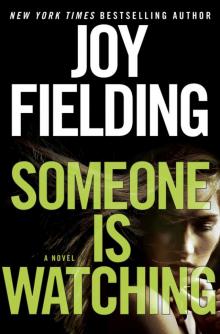 Someone Is Watching
Someone Is Watching Heartstopper
Heartstopper See Jane Run
See Jane Run The Bad Daughter
The Bad Daughter Shadow Creek
Shadow Creek Missing Pieces
Missing Pieces Kiss Mommy Goodbye
Kiss Mommy Goodbye Grand Avenue
Grand Avenue